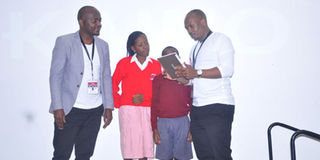ICT in education, dawn of a new era

Cedric Namakoola (chief admistrative officer KAINO), Paula Kembabazi from Lohana Academy, Rolland Muwanguzi from Kitante Primary School and Alfred Opio, the chief executive officer of Kaino Africa demonstrate how the KAINO tablet works. PHOTO BY SHABIBAH NAKIRIGYA
School and learning for us was a whole lot different from learning today. Reading about a topic for example would mean going into the library, scouting for all books that might have the information you are looking for, flip through the pages one by one until you get or fail to get what you want.
Today, it is a matter of punching what you are looking for into Google and you will have the information you are looking for,” Martin Mukasa, a civil engineer, shares his experience. “Today, one does not necessarily have to buy physical textbooks because they can buy them online, make screenshots of what they are reading about, so no need for printing costs,” he adds.
At all levels of education, more and more technological advancements are being realised in bettering both the teacher and learner experiences. Increasingly, new technologies are entering the classroom both in and outside Uganda, most recent of those being the Kaino Tablet crafted for the Ugandan student by Kaino Africa.
George Couros, the author of the Innovative Mindset and educator, once noted on his blog that, “technology will never replace great teachers, but technology in the hands of a great teacher can be transformational.”
It is on this very philosophy that Kaino is based – putting technology in the hands of great teachers for a transformative change in the teacher learner experience. “…the opportunities teachers are afforded now are truly transformational for our learners,” Couros adds.
About the tab
During its launch at Skyz Hotel Naguru last week, Alfred Opio, the chief executive officer Kaino Africa, said the new Education Technology (EdTech) tablet comes with curriculum aligned teacher guides that show the teacher lesson plans; how they are supposed to proceed with the class, what examples to give as well as time the lesson is supposed to start and end.
“It also comes with well-prepared notes since we partner with the best content providers to provide content relevant to Ugandans.
It has offline and online past papers, exams and instant assessments at the end of the tests. In addition, are digitalised text books from credible publishers that are cheap (between USD1 to USD10) while maintaining quality,” he explains.
Furthermore, it is a 3G triggered device powered by android, running on geo-fencing technology and has a 24/7 GPS system running to conquer and manage teacher time management and attendance.
Since the system is preset on what a teacher is supposed to be teaching, it also has a self-assessment bar that helps teachers track their progress which is accessible to the parent and school administrators
“However, one is also able to access the system through the two versions - the android application which can be downloaded, and the web application that is accessed on our website. The tab, is therefore, our main product channel to be primarily used by teachers,” Opio said.
Concerns
On the part of parents, Margaret Nimusiima Kalyango, expressed concern that though the tablet is a step in the right direction towards incorporating technological changes in our education system, she is skeptical about the cost this might come with.
“What if my child’s school does not subscribe to the system, but I have bought the tab and yet the teacher expects them to have notes that they specifically give them in class, how acceptable will the notes that come on the tab be?” Nimusiima asks.
Opio explains that the plan is to start with pre-primary school and primary, then secondary up to university eventually. “The product is up and running, but it is still on a private beta. So, we are going to pilot this in three schools in Uganda for one term. After finalising with the tests, it will be commercialised in 2019,” he reveals.




